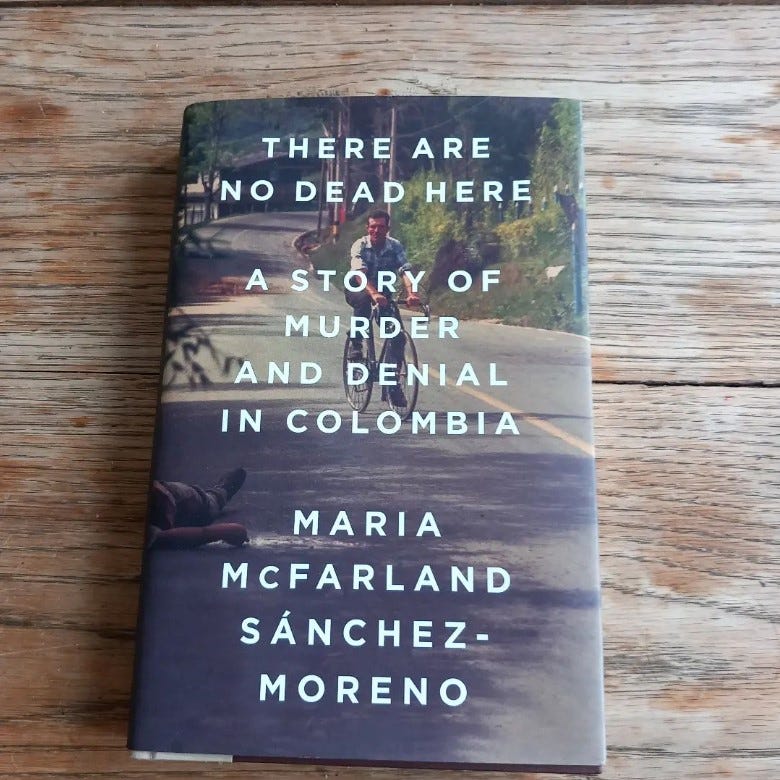Spectres Between the Lines: Maria McFarland Sanchez-Moreno and Atrocity Reporting
A review of There Are No Dead Here: A Story of Murder and Denial in Colombia
What is it that makes true crime/report literature truly valuable? Is it presenting the facts as comprehensively as possible, or leaving room for enough reflection/inflection from the writer on the wider existential impact of the events?
The answer, of course, depends on the audience, context, publication and subject matter. Maria McFarland Sanchez-Moreno, human rights activist and author of There Are No Dead Here: A Story of Murder and Denial in Colombia understands that this is a balancing act. She veers towards the former persuasion for this exhaustive, exceptionally researched book, but makes it thoroughly gripping all the same.
When it comes to Colombia's bloody history, it's fair to say that Pablo Escobar claims the majority of the headlines. What's less well-known is that his death in 1993 opened the door to a period of bloodshed, corruption, bribery and collusion that arguably surpassed his era. A story of right-wing paramilitaries, untold suffering and complicity that goes to the very top of government, There Are No Dead Here is an uncompromising account of one of Colombia's darkest chapters.
It follows the efforts of three men – the human rights activist Jesus Maria Valle, the prosecutor Ivan Velazquez and the journalist Ricardo Calderon – who risked everything in an attempt to bring the brutal escapade to an end. With startling access to/interviews with key witnesses and participants in the horror, it's a thorough telling, but one with still so many questions left unanswered.
There are no two ways about it - it's not a pleasant read. The first half of the book presents like a nightmare, accounting events and massacres so cruel that they seem genuinely inhuman. There's something unflinching and seer-like about Sanchez-Moreno's writing, unfailing in its desire to present the truth but also removed. She presents the events and perpetrators without much sense of self, allowing them to portray themselves. The power of this holistic approach gives them plenty of rope to hang themselves with.
The second half of the book ruminates far more on the chest-tightening tension and suffocating atmosphere that existed in the streets, hotel lobbies and corridors of political power within the country. It's here that the intrigue and more recognisably human elements are brought to life, albeit irreversibly shrouded in a mysterious and uncompromising web of distortion, imprisonment, conflicting accounts and denial. Sanchez-Moreno isn’t necessarily more approachable here, but it's challenging to come away with any other opinion of former president Alvaro Uribe, for example, than that he's an absolute wrong'un.
Sanchez-Moreno talks the War on Drugs, organised crime, totalitarianism and reform
If it's tempting to view the brutality and Machiavellian machinations of the period as being a product of a particular time and place, then think again. The paranoia and anxiety that stalks the protagonists, their families and ordinary people of Colombia daily throughout this period holds a candle to numerous situations across the world within the last 100 years or so. Chile and Argentina both experienced identikit spells of murkiness, while the dirty spectre of The Northern Irish Troubles is impossible to ignore.
The euphemistically titled Administrative Department of Security (DAS) is pretty much a mirror image of the KGB or Stasi. Sanchez-Moreno's work perfectly exemplifies how Colombia's experience of bureaucratic misanthropy is not something that exists in regions somewhat unattainable; this is how violence is maintained, lies are upheld and justice is eluded all over the world.
Like many books of its kind, There Are No Dead Here is a roll call of names, dates and heaviness, not always making for the most accessible prose. At just under 300 pages in length, it leaves little room for meditation or emotional absorption. But that human element weaves its way through the fog of nomenclature and atrocities quietly and with assured sensitivity, making the book as effective and gripping as any objective account.
You can purchase There Are No Dead Here: A Story of Murder and Denial in Colombia here.





Feckin scalpel reviewing right there